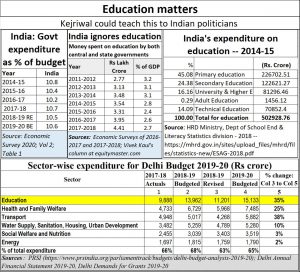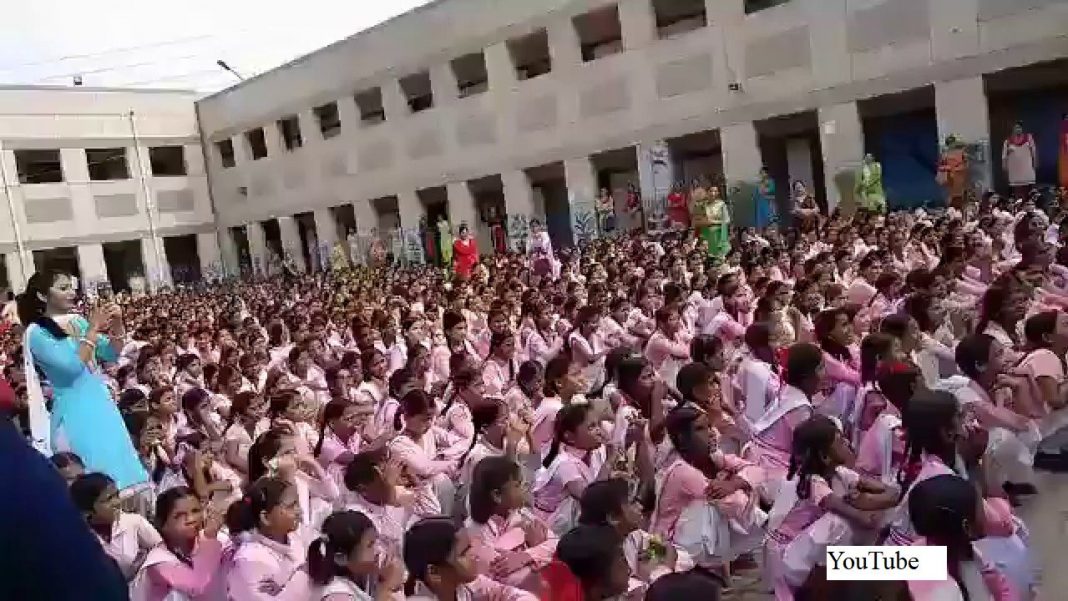https://www.freepressjournal.in/analysis/education-matters-thats-why-kejri-matters
Education lessons from Kejriwal
RN Bhaskar — 5 March 2020
The recent Delhi elections confirmed one thing – that the formidable election machine Modi and the BJP had built was no match for the Delhi chief minister Arvind Kejriwal. Like all politicians he too offered sops to his electorate. But ask the people – and the most endearing sop they admire him for is education.
 First, a caveat. This author stays in Mumbai hence expects no favors from the present Delhi government. But he has friends in Delhi. Each of them has a housemaid, or a driver, or a boy who fetches vegetables and sundry items from the markets for them. Each of them – by and large – talks of how their families have taken out their children from expensive private schools and have moved them to government-run schools.
First, a caveat. This author stays in Mumbai hence expects no favors from the present Delhi government. But he has friends in Delhi. Each of them has a housemaid, or a driver, or a boy who fetches vegetables and sundry items from the markets for them. Each of them – by and large – talks of how their families have taken out their children from expensive private schools and have moved them to government-run schools.
There are several reasons why they have done this.
First, the government schools in Delhi teach the child English which – whether you like it or not – is the aspirational language. Kejriwal did not push for local languages. He – and the parents — knew that a knowledge of English provides the youth better jobs and higher salaries. It makes them capable of looking at a global market for jobs. Remember, parents are no less concerned about the future of their children, inasmuch as politicians claim to be.
Second, Delhi spends more on school education– which is what the Constitution too enjoins India’s policymakers to do — than any other government in India. Kejriwal’s government was already spending 26% of his annual budget on school education. It has hiked it by another 35% (see chart alongside). The parents know that Delhi-government-schools today have better furniture and more facilities than many private schools – and at significantly lower fees.
Third, Kejriwal has made the community responsible in determining whether teachers well. The teacher is monitored on outcomes, not merely by the attendance register. Result, the quality of teaching has improved. Teachers are more regular. They have lost the ability of asking a politician godfather to intervene when the community calls for his or her dismissal.
Expect, therefore, the Delhi-government-school-boy-or-girl to be more competitive in the employment markets 10-15 years later than a child from Maharashtra will be.
Doing all this costs money, Kejriwal knows this. So instead of buying expensive cars for his party politicians, instead of building statues and wasting public money, instead of building memorials to promote certain select individuals, Kejriwal has focused on school education instead.
This is precisely what the central government has not done. True, education is a state subject. But financial policies are largely with the centre. The centre can decide which school trust should be granted tax exemption. That can be done by insisting on proof of outcomes, rather than mere enrolments.
Instead, central and state governments together spend very little on education, and do not bother much on monitoring outcomes. They have thus destroyed the future of children who will have to approach a far more competitive employment market in the future than ever before. They will have wasted the 10-15 years of a child’s life in school where he or she has learnt precious little. To understand how guilty both state and central governments have been over the past several decades, one only must look up the ASER reports of Pratham. Its latest report (https://img.asercentre.org/docs/ASER%202018/Release%20Material/aserreport2018.pdf) shows how, in 2018, only 44.2% of the boys in Std V could read the books meant for Std II. The success rate had declined from 53.1% in 2008.
Both central and state governments should spend more money on primary and secondary education, because those are the building blocks of a child’s occupational (and even existential) future. They should reserve higher education only for the meritorious and often without government subsidy. However, the brightest in India should enjoy a scholarship for which private institutes will have to reserve seats. Thus, higher education too must be based, not on reservations, but on competence.
As this author has pointed out earlier, it is strange that this country should insist on excellence in selecting people for the national cricket teams – without reservation. But it wants reservation in the most crucial sectors of economic and social life, disregardful of merit. This author advocates offering benefits to the underprivileged by providing them additional educational and nutritional inputs at the school levels. But merit must prevail thereafter in every sphere. Unless this is done, do not expect India to remain a global economic power. You can kiss that dream goodbye!
Similarly, if the Maharashtra government – constantly whining about poor enrolment rates in its municipal schools – probes further, it too will understand why Kejriwal’s focus on education is not only politically compelling but is a social and economic imperative too.






































COMMENTS